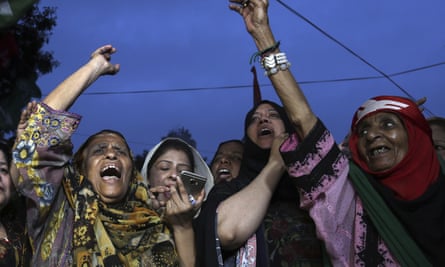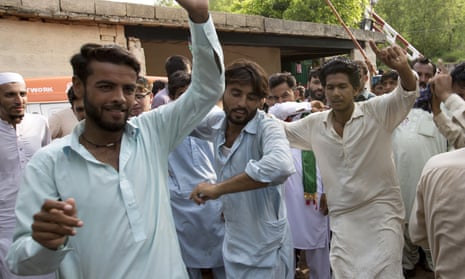The former international cricket star Imran Khan has declared victory in Pakistan’s general election, hailing what he described as “the fairest” vote in the country’s history, despite widespread allegations it was rigged in favour of his Tehreek-e-Insaf (PTI) party.
In a televised address to the nation from his house in Bani Gala, a wealthy suburb of Islamabad, Khan struck a unifying tone, pledging to rise above personal attacks and lift up the poor.
With half the vote counted – more than 15 hours after the official result was due – the PTI was projected to win about 120 of the 272 contested seats in the national assembly, leaving it only a few shy of a majority coalition.
Early on Thursday morning, Shahbaz Sharif, the leader of the second-placed Pakistan Muslim League-Nawaz (PML-N), said his party would “wholly reject” the result. “It is a sheer rigging. The way the people’s mandate has blatantly been insulted, it is intolerable,” Sharif said.
Leaders from six major parties alleged that their polling agents – workers who keep an eye on the count – were evicted from ballot-booths by security officials in contravention of electoral rules.
Khan said: “I feel that this election has been the fairest in Pakistan’s history. If any party has any doubts, we will open the results of those constituencies up for investigation.”
Appearing calm, the 65-year-old promised to improve Pakistan’s governance, widen the tax base and shun the VIP lifestyle of previous rulers. He said he would be “ashamed” to live in the lavish prime minister’s house, and would turn it into an “educational institution”.
“His speech will calm people down a bit,” said Asad Liaqat of Harvard University, describing it as Khan’s best in years and in contrast to the “obnoxious victory speech” many would have expected.
Although results are not expected to be finalised until late on Thursday evening or early on Friday, the PTI seems likely to make an unprecedented sweep of Pakistan. It stands to control the central government, provincial governments in the crucial province of Punjab and northern Khyber Pakhtunkhwa, as well as holding a dominant position in the southern business capital of Karachi.
This means the party will find it easier to implement policies across the nation.
“His first priority needs to be macroeconomic stability,” said columnist Mosharraf Zaidi, “and addressing the balance of payments crisis that is staring Pakistan in the face.”

The election marked only the second time in Pakistan’s 71-year history that one civilian government has handed power to another in the country of 200 million people. There was, however, still widespread concern during the campaign about manipulation by the military, which has directly or indirectly ruled Pakistan for most of its existence.
The PML-N, the party of Shahbaz Sharif’s brother, the jailed former prime minister Nawaz Sharif, repeatedly complained that it was being targeted by the security establishment during the campaign.
Khan has staunchly denied allegations by PML-N that he is getting help from the military. The army, which also dismisses allegations of meddling, deployed 371,000 soldiers at polling stations across the country, nearly five times more than the last election in 2013.
As voting got under way on Wednesday in the south-western city of Quetta, the Balochistan provincial capital, a suicide bomber attacked a crowded polling station, killing 31 people. Balochistan also saw the worst violence during campaigning earlier this month, when a suicide bomber struck a political rally, killing 149 people.
While there was no sign of popular protests on Thursday, Sen Mir Hasil Khan Bezinjo, president of the National party, said that “all major political parties who rejected the vote” would hold a press conference on Friday.
The EU’s Election Observation Mission will also give its report on the conduct of the poll on Friday. The results from the respected organisation – which also observed the previous vote in 2013 – are likely to impact what the losing parties do next.
Shahbaz Sharif has not been heard from since his firebrand speech on Thursday, and one PML-N insider said that he decided at a party meeting later in the day to protest against the vote in parliament and not on the streets, in a move that reduces the chance of prolonged instability.
Complaints have also emerged from Pakistan’s independent human rights commission, which issued a statement saying women had not been allowed to vote in some places.
In other areas, it said “polling staff appeared to be biased toward a certain party”, but did not name the party. In the days before the election, the rights activist IA Rehman called the campaign the dirtiest in his country’s troubled journey towards sustained democracy.
Provisional results put the liberal Pakistan Peoples party (PPP), led by Bilawal Bhutto, the son of assassinated two-time prime minister Benazir Bhutto, in third place, ahead in 42 constituencies.
Far-right religious parties did not make any significant gains, to the relief of many Pakistanis, although Aamir Liaquat Hussain, a controversial TV host banned from screens for inciting violence against minorities, won a seat for the PTI in Karachi.
Khan’s success in the election is a stunning rise for the charismatic anti-corruption crusader who has spent much of his political career on the fringes of Pakistani politics.
On foreign policy, he lamented on Thursday that Indian media had portrayed him as a “Bollywood villain” ahead of the vote, but said that if Pakistan’s warring neighbour took one step towards peace “we would take two”. He also promised stronger relations with Saudi Arabia and China, while coolly demanding a less “one-sided” relationship with the United States, which he came to political prominence for criticising over its drone strikes in 2011.
Analysts noted that Khan’s call for open borders and trade with Afghanistan contrasted with the ongoing, military-led construction of a fence along the Durand Line separating the two nations – an early sighting of potential conflict between the army and the man many term their “blue-eyed-boy”.
